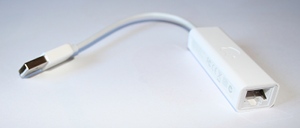system-config-network-tui and editing
config files (we have no version of X installed) to configure the
built-in ethernet adapter.I found a few notes stating that the Apple USB Ethernet adapter works well under Linux. We're an Apple shop, so we have plenty and that'll do for the short term while we track down a better PCI-X ethernet adapter for this server.
So, I downloaded & installed (make and make
install) the
appropriate version of the recommended AX88178 driver (Linux 2.6.38;
for "Android 1.x/2.x/3.0, Linux kernel 2.6.14 and later"). After
plugging in the Apple USB Ethernet adapter, it does show in the
results of lsusb, but does not show in the options
when I run system-config-network-tui.
The .ko file that was compiled & installed was "asix.ko" and
if I run lsmod | grep asix, I get the following:
asix 82176 0
mii 38849 1 asix
So, does that the kernel module is correctly installed & loaded?
Do I need to alias "eth2" ("eth0" is the built-in ethernet and "eth1"
is listed in system-config-network-tui as "skge", but
is definitely not what I just plugged in) to "asix" in
/etc/modules.conf
as
noted here? What other steps might I be missing?
Of note: I do now see a "dev23116" network interface when I run
ifconfig -a that wasn't there before I installed the
drivers. Is that the USB ethernet adapter? If so, do I
alias that or use that as the interface's device in system-config-network-tui?
| share|improve this question |
asked
Sep 20 '11 at 22:20
morgant |
